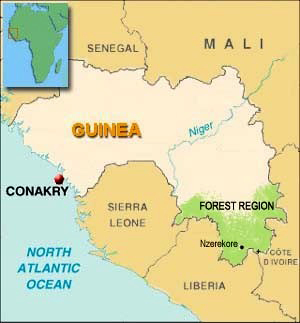After months of pleas to authorities from village leaders, the Malian and Guinean governments say they will take steps to prevent further violence over land rights along their border, where three clashes in less than six months have killed 11 people and injured at least 30 others.
After late November meetings, authorities from both countries announced the resumption of a long-inactive mixed patrol force along the Mali-Guinea border.
“We have agreed … to provide border security forces from both countries with adequate forms of communication, in order to encourage and expand the exchange of information to better secure the border areas,” said Malian Minister of Territorial Administration, General Kafougouna Koné.
In early November, Guinean villagers – reportedly armed with hunting rifles and machetes – burned homes, stole cattle, killed six Malians and injured 20 others. Similar clashes over land rights took place in July, in May and in 2006, all between villagers in the Mandiana prefecture of Guinea and Mali’s Yanfofila prefecture.
Too little, too late?
Following an August meeting between interior ministers of both countries, regional governors travelled along the border trying to convince villagers to resort to peaceful means of negotiation when disputes arose. Authorities also promised to revive the patrol force, but according to local leaders, military along the border did not even have ammunition.
Ever since the July attacks, those local leaders had been demanding that authorities provide their villages more protection – but they say their demands fell on deaf ears.
After the killing of an elder in the Malian village of Siradiouba in May, village leader Demba Seydou Sidibé travelled to the capital Bamako to try to convince authorities of the need for a military base in his village.
“I spent two weeks in Bamako without being able to meet either of the ministers responsible,” he said.
Days after his return, the latest set of clashes erupted – clashes he said could have been avoided.
“It’s time the government stop this laxity, which consists of plugging leaking holes, [but not fixing the problem]. Instead of concrete measures that could have – at the least – consisted of deploying a contingent of soldiers at the border, our authorities launched themselves into diplomacy with no benefit for the people of Siradiouba.”
Other measures
Following a meeting of ministers on 23 November, additional measures were announced.
“We have agreed to pursue before the courts in both countries those responsible for the crimes and offences committed along the border, to restore stolen goods on one side and the other, to the continue the education mission along the border by prefects of Yanfolila and Mandiana, in collaboration with locally elected officials,” Minister Koné said.
Separate meetings between the countries’ prime ministers resulted in commitments to hold regular meetings of border authorities from the national to the local level, as well as a forum gathering border authorities in the first trimester of 2008. They also promised to involve women and traditional communicators in all the steps of the resolution of the matter.
Koné said the organisation of patrols along the border has already begun. Still, village leader Sidibé has his doubts.
“If nothing is done, the conflicts along the Mali-Guinea border could be the object of armed conflicts between the two countries sooner or later.”
sd/ha/np
This article was produced by IRIN News while it was part of the United Nations Office for the Coordination of Humanitarian Affairs. Please send queries on copyright or liability to the UN. For more information: https://shop.un.org/rights-permissions




